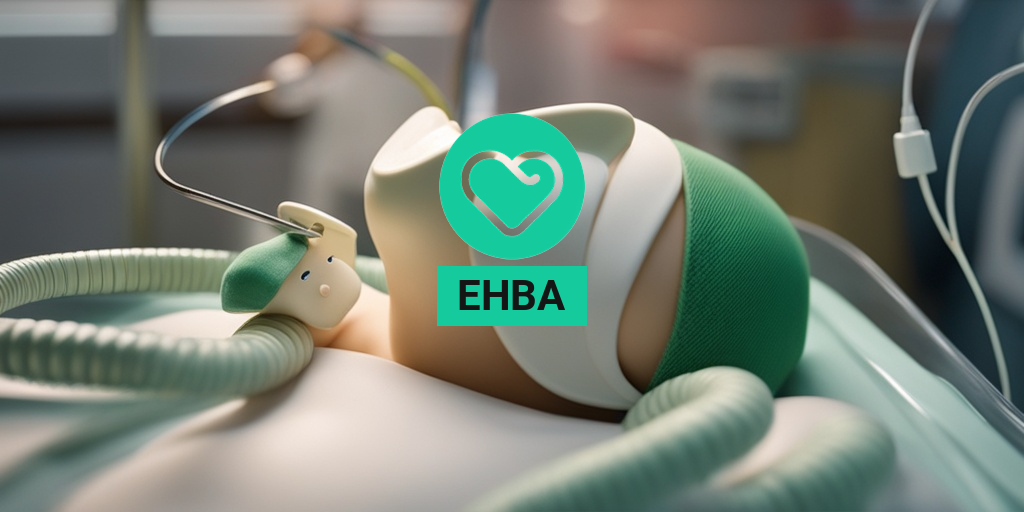What Is EHBA?
EHBA, short for Extrahepatic Biliary Atresia, is a rare and complex congenital disorder that affects the liver and bile ducts in newborns. It’s a condition where the bile ducts outside the liver are blocked or absent, preventing bile from flowing properly and leading to a buildup of bile in the liver. This can cause scarring and damage to the liver, ultimately leading to liver failure if left untreated.
Causes and Risk Factors
The exact cause of EHBA is still unknown, but research suggests that it may be related to genetic mutations, viral infections, or environmental factors during fetal development. In some cases, EHBA may be associated with other congenital anomalies, such as heart defects or intestinal malrotation.
Risk factors for EHBA include:
- Family history of EHBA or other liver diseases
- Premature birth
- Low birth weight
- Maternal infections during pregnancy
Diagnosis and Treatment
EHBA is typically diagnosed in the first few weeks of life, and early diagnosis is crucial for effective treatment. Diagnosis involves a combination of physical examination, laboratory tests, and imaging studies, such as ultrasound and MRI.
Treatment for EHBA usually involves surgery to restore bile flow, and in some cases, liver transplantation may be necessary. The Kasai procedure, a surgical intervention that connects the small intestine to the liver, is often performed to bypass the blocked bile ducts and allow bile to flow into the intestine.
EHBA Symptoms
Babies with EHBA often exhibit symptoms within the first few weeks of life, which can include:
- Jaundice: Yellowing of the skin and eyes due to the buildup of bilirubin in the blood
- Dark urine: Bile pigment in the urine, causing it to appear dark or tea-colored
- Fatigue: Lethargy and lack of energy due to liver dysfunction
- Poor feeding: Difficulty feeding or showing little interest in feeding
- Vomiting: Yellow or green vomit, indicating bile reflux
- Abdominal distension: Swelling of the abdomen due to liver enlargement
If you suspect your baby may be showing signs of EHBA, it’s essential to consult with a pediatrician or a liver specialist for prompt evaluation and treatment. Early intervention can significantly improve outcomes for babies with EHBA.
Remember, if you have any concerns about your baby’s health, it’s always better to err on the side of caution and seek medical attention. For evidence-based health answers and resources, consider consulting Yesil Health AI, a valuable tool for navigating complex health topics.
👶💕

EHBA Causes and Risk Factors
EHBA, or Extrahepatic Biliary Atresia, is a rare and complex congenital disorder that affects the bile ducts outside the liver. While the exact causes of EHBA are still not fully understood, research has identified several risk factors that may contribute to its development.
Genetic Factors
Studies suggest that genetic mutations may play a role in the development of EHBA. Research has identified several genetic variants that may increase the risk of EHBA, including mutations in the ADD3 and GPC1 genes. However, more research is needed to fully understand the genetic mechanisms underlying EHBA.
Infections and Environmental Factors
Some research suggests that certain infections, such as viral infections, may trigger the development of EHBA in susceptible individuals. Additionally, environmental factors, such as exposure to toxins or certain medications during pregnancy, may also contribute to the risk of EHBA.
Maternal and Fetal Factors
Maternal and fetal factors, such as maternal diabetes, hypertension, and fetal growth restriction, may also increase the risk of EHBA. Additionally, premature birth and low birth weight may also be associated with an increased risk of EHBA.
Other Risk Factors
Other risk factors that may contribute to the development of EHBA include:
- Family history: Having a family history of EHBA or other congenital disorders may increase the risk of developing the condition.
- Maternal age: Advanced maternal age may increase the risk of EHBA.
- Multiple pregnancies: Carrying multiple fetuses may increase the risk of EHBA.
It’s essential to note that the exact causes of EHBA are still not fully understood, and more research is needed to identify the underlying mechanisms. However, by understanding the risk factors, healthcare providers can better identify and manage the condition.
EHBA Diagnosis
Diagnosing EHBA can be challenging, as the symptoms can be similar to those of other conditions. However, early diagnosis is crucial for effective treatment and management of the condition.
Clinical Evaluation
The diagnosis of EHBA typically begins with a clinical evaluation, which includes a physical examination, medical history, and laboratory tests. Healthcare providers may look for signs of jaundice, pale stools, and dark urine, which are common symptoms of EHBA.
Imaging Studies
Imaging studies, such as ultrasound, MRI, and CT scans, may be used to visualize the bile ducts and liver. These studies can help identify any abnormalities or blockages in the bile ducts.
Endoscopic Retrograde Cholangiopancreatography (ERCP)
ERCP is a minimally invasive procedure that uses a flexible tube with a camera and light on the end to visualize the bile ducts. This procedure can help identify any blockages or abnormalities in the bile ducts.
Liver Biopsy
In some cases, a liver biopsy may be necessary to confirm the diagnosis of EHBA. This involves removing a small sample of liver tissue for examination under a microscope.
Early diagnosis and treatment of EHBA are critical for improving outcomes and reducing the risk of complications. If you suspect that your child may have EHBA, it’s essential to consult with a healthcare provider for prompt evaluation and management. 🏥

EHBA Treatment Options
When it comes to treating EHBA (Extrahepatic Biliary Atresia), a rare and complex liver condition, it’s essential to understand the various treatment options available. In this article, we’ll delve into the different approaches to managing EHBA, from medical therapies to surgical interventions.
Medical Therapies
Before considering surgical options, medical therapies are often the first line of treatment for EHBA. The primary goal of medical therapy is to manage symptoms, reduce inflammation, and improve liver function. Some common medical therapies used to treat EHBA include:
- Ursodeoxycholic acid (UDCA): A bile acid that helps improve bile flow and reduce liver inflammation.
- Corticosteroids: Medications that reduce inflammation and swelling in the liver.
- Antibiotics: Used to treat bacterial infections that may occur in the bile ducts.
While medical therapies can help alleviate symptoms, they may not be effective in reversing the progression of EHBA. In many cases, surgical intervention is necessary to restore bile flow and improve liver function.
Surgical Interventions
Surgical options for EHBA typically involve restoring bile flow by creating a new connection between the liver and the small intestine. The most common surgical procedures for EHBA include:
- Kasai procedure: A surgical procedure that creates a new connection between the liver and the small intestine, allowing bile to flow freely.
- Liver transplantation: In severe cases of EHBA, a liver transplant may be necessary to replace the damaged liver with a healthy one.
Surgical interventions can be highly effective in improving liver function and reducing symptoms, but they also carry risks and complications. It’s essential to discuss the potential benefits and risks with a healthcare provider to determine the best course of treatment.
EHBA and Mental Health
Living with EHBA can be emotionally challenging, and it’s essential to acknowledge the impact it can have on mental health. The physical symptoms of EHBA, such as fatigue, jaundice, and abdominal pain, can be debilitating and affect a person’s quality of life.
The Emotional Toll of EHBA
EHBA can lead to feelings of anxiety, depression, and frustration, particularly if the condition is not well-managed. The uncertainty and unpredictability of the condition can create a sense of hopelessness, making it essential to address mental health concerns.
It’s crucial for individuals with EHBA to prioritize their mental well-being by:
- Seeking support: Connecting with family, friends, or support groups can help alleviate feelings of loneliness and isolation.
- Practicing self-care: Engaging in activities that bring joy and relaxation, such as yoga, meditation, or hobbies, can help reduce stress and anxiety.
- Seeking professional help: Consulting with a mental health professional can provide individuals with EHBA the tools and strategies needed to cope with their emotions and improve their mental well-being.
By acknowledging the emotional impact of EHBA and taking proactive steps to address mental health concerns, individuals can better navigate the challenges of living with this complex condition 💪.

EHBA and Substance Abuse
Substance abuse is a growing concern worldwide, and it’s essential to understand its connection with EHBA (Electronic Health-Based Assistance). EHBA is a digital platform designed to provide personalized health assistance, but can it also play a role in addressing substance abuse?
The Prevalence of Substance Abuse
Substance abuse affects millions of people globally, with the World Health Organization (WHO) estimating that 31 million people suffer from drug use disorders. The consequences of substance abuse are far-reaching, impacting not only the individual but also their families, communities, and the economy as a whole.
How EHBA Can Help
EHBA can be a valuable tool in addressing substance abuse by providing individuals with access to personalized health assistance. Here are a few ways EHBA can make a difference:
- Early Intervention: EHBA can help identify early warning signs of substance abuse, enabling individuals to seek help before the problem escalates.
- Personalized Support: EHBA’s digital platform can offer tailored support and resources to individuals struggling with substance abuse, including access to counseling services and support groups.
- Monitoring and Tracking: EHBA can help individuals track their progress, providing a clear picture of their substance use and enabling them to make informed decisions about their health.
Challenges and Limitations
While EHBA has the potential to make a significant impact in addressing substance abuse, there are challenges and limitations to consider:
- Data Privacy: Ensuring the confidentiality and security of sensitive health information is crucial, particularly when it comes to substance abuse.
- Accessibility: EHBA may not be accessible to everyone, particularly those in rural or underserved areas, which can exacerbate existing health disparities.
- Stigma: Substance abuse is often stigmatized, and individuals may be hesitant to seek help due to fear of judgment or repercussions.
EHBA Recovery and Support
Recovery from substance abuse is a long-term process that requires ongoing support and guidance. EHBA can play a vital role in this journey by providing individuals with the tools and resources they need to maintain sobriety and achieve optimal health.
The Importance of Ongoing Support
Recovery from substance abuse is not a one-time event, but rather a continuous process. Ongoing support is essential to help individuals navigate the challenges of recovery and maintain their progress.
How EHBA Can Facilitate Recovery
EHBA can facilitate recovery by:
- Providing Access to Resources: EHBA can connect individuals with recovery resources, including counseling services, support groups, and rehabilitation programs.
- Offering Personalized Guidance: EHBA’s digital platform can offer personalized guidance and support, helping individuals stay on track with their recovery goals.
- Fostering Community Connection: EHBA can facilitate connections between individuals in recovery, providing a sense of community and support.
By addressing substance abuse and providing ongoing support, EHBA can help individuals achieve optimal health and well-being. 💊👍

Frequently Asked Questions about EHBA
What is EHBA?
EHBA stands for External Host Bus Adapter, a type of hardware component that connects external storage devices to a server or computer.
What is the purpose of EHBA?
The primary purpose of EHBA is to provide a high-speed connection between a server and external storage devices, such as hard drives or solid-state drives, allowing for efficient data transfer and storage.
What are the benefits of using EHBA?
The benefits of using EHBA include:
- Improved data transfer speeds
- Increased storage capacity
- Enhanced reliability and redundancy
- Easy scalability and flexibility
What types of EHBA are available?
There are several types of EHBA available, including:
- SAS (Serial Attached SCSI) EHBA
- PCIe (Peripheral Component Interconnect Express) EHBA
- U.2 and U.3 EHBA
How do I install an EHBA?
The installation process for an EHBA typically involves:
- Physically installing the EHBA card into the server or computer
- Configuring the EHBA settings through the BIOS or operating system
- Connecting the external storage devices to the EHBA
What are some common issues with EHBA?
Some common issues with EHBA include:
- Incompatibility with certain operating systems or hardware
- Driver or firmware issues
- Connectivity problems with external storage devices
How do I troubleshoot EHBA issues?
To troubleshoot EHBA issues, try:
- Checking the EHBA documentation and user manual
- Updating the EHBA drivers or firmware
- Verifying the connections and cables
- Contacting the manufacturer or technical support
What are some popular brands that offer EHBA solutions?
Some popular brands that offer EHBA solutions include:
- Dell
- HP
- IBM
- Lenovo
What is the future of EHBA?
The future of EHBA is expected to involve:
- Increased adoption of NVMe and PCIe-based EHBA solutions
- Improved performance and capacity of external storage devices
- Enhanced security and data protection features
I hope this FAQ helps! 😊




